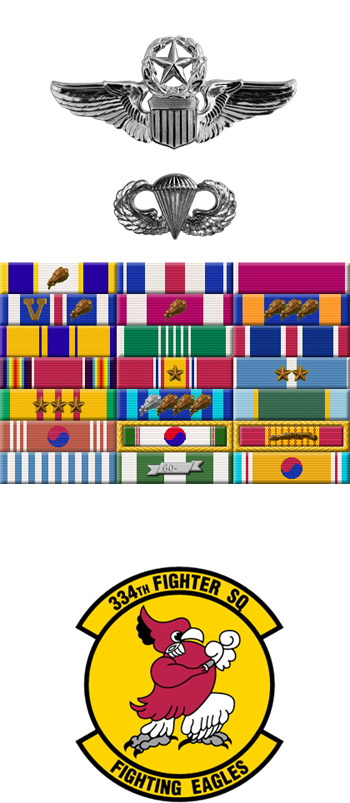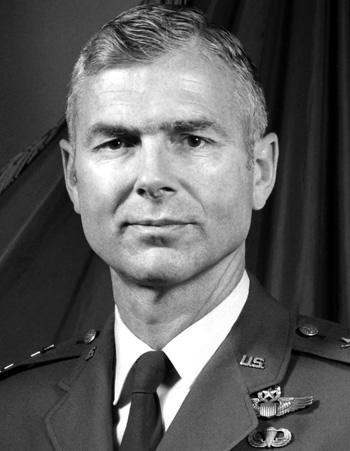
|
Charles G. Cleveland |
 |
|||
| Rank, Service | ||||
Lieutenant General O-9, U.S. Air Force |
||||
| Veteran of: | ||||
|
||||
| Tribute: | ||||
Chick Cleveland was born in 1927 in Honolulu, Hawaii. He entered the U.S. Military Academy at West Point, New York, in 1945, and graduated with a commission as a 2d Lt in the U.S. Air Force on June 7, 1949. Lt Cleveland then entered Undergraduate Pilot Training, earning his pilot wings at Williams AFB, Arizona, in September 1950, followed by service with the 31st Strategic Fighter Wing (SFW) at Turner AFB, Georgia, until March 1952. He then deployed to Korea, where he was assigned to the 334th Fighter Interceptor Squadron of the 4th Fighter Interceptor Wing at Kimpo AB, South Korea, from March to November 1952, during which time he was credited with the destruction of 5 enemy aircraft in aerial combat plus 1 probable and 4 damaged. Cleveland then returned to Turner AFB, where he served with the 31st SFW until July 1957, when he transferred to the 522nd Fighter-Bomber Squadron of the 27th Fighter-Bomber Wing at Bergstrom AFB, Texas. He also served with the 481st Tactical Fighter Squadron (TFS) while stationed at Bergstrom, and then served with the 78th TFS at RAF Woodbridge, England, from February 1959 to 1962. Maj Cleveland commanded the 92nd TFS at RAF Bentwaters, England, from 1962 to 1963, and then served as an F-111 project officer at Wright-Patterson AFB, Ohio, until May 1966. His next assignment was as executive assistant to Gen William Westmoreland with the U.S. Military Assistance Command in Vietnam from May 1966 to June 1967, followed by attending the Royal Air Force College of Air Warfare from June to December 1967. Col Cleveland was Special Assistant to the Director of Operations for the 81st Tactical Fighter Wing (TFW) at RAF Bentwaters from December 1967 to July 1968, followed by service as Chief of Tactical Evaluation with Headquarters 3rd Air Force at South Ruislip AS, England, until April 1970. He then served as Vice Commander of the 20th TFW at RAF Upper Heyford, England, overseeing the transition from F-100 Super Sabres to the F-111 Aardvark, from April 1970 to June 1971. He served as Commander of the 3535th Navigator Training Wing at Mather AFB, California, until June 1972. From June 1972 until July 1975, he served on the staff of Headquarters Air Training Command at Randolph AFB, Texas. Gen Cleveland next served as Director of Personnel Programs with Headquarters U.S. Air Force in the Pentagon from July 1975 to March 1979, followed by service as Vice Commander of Air Training Command from March 1979 to July 1981. His final assignment was as Commander of Air University at Maxwell AFB, Alabama, from July 1981 until his retirement from the Air Force on August 1, 1984. Gen Cleveland wears Command Pilot Wings and the Parachutist Badge, and accumulated over 4,300 flying hours during his Air Force Career. |
||||
|
||||

